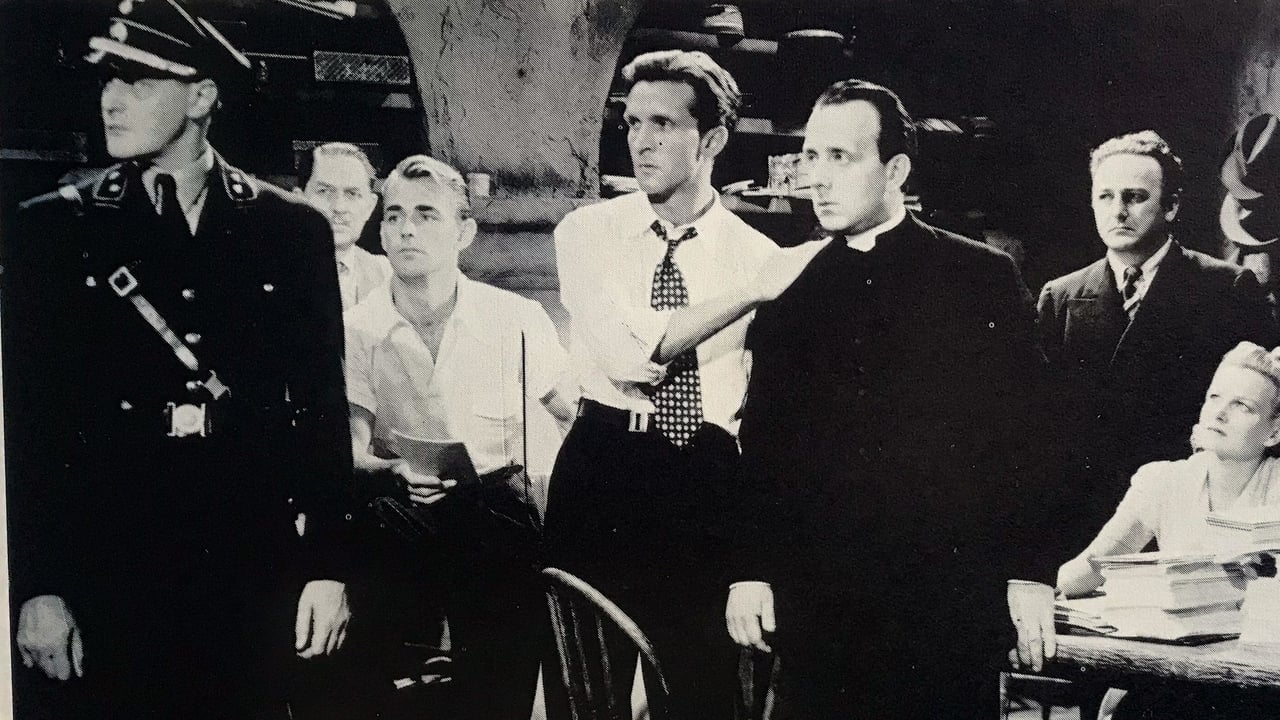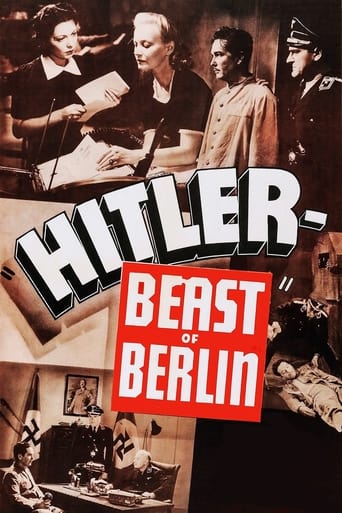

In every war, there are going to be those on one side who do not believe in the cause that their country is fighting for, whether they are fighting for good or for evil. In the case of this PRC programmer, the focus is on the good Germans who despise the Hitler regime and their efforts to stop him no matter what it takes. Even men in German officers's uniform are not necessarily on the side of da Furhrer, and even the bravest men in the resistance aren't without fear of being caught and shot (or tortured) which leads to some pretty drastic measures by their own cohorts in an effort to keep their secrets safe. The story focuses on a happily married couple (Roland Drew and Steffi Duna) whose involvement in fighting against the Nazi's leads one of them to imprisonment. Among those helping them is Duna's brother, the blonde and Arian Alan Ladd in his first credited role. While the subject is noble and told in an effective manner, the harshness of the propaganda and one dimensional characters make this a weak (although very early) entry in the Hollywood war against the rise of the Nazi regime. Ladd's appearance is of interesting historical note, although he is not the lead. However, his blonde good looks make him perfect for the Arian look although his character is far from on the side of the final resolution. Hollywood did better on this subject through the main studios with such unforgettable titles as "Confessions of a Nazi Spy", "The Mortal Storm", "All Through the Night" and "Edge of Darkness".
... View MoreDespite the Nazis being horrid monsters, this side of Nazi Germany went unnoticed in American films until about 1939. This was for two reasons: Most Americans couldn't have cared less about conditions in Europe and the US Congress enacted legislation to force film studios to remain neutral about the brewing war. Eventually, in 1939 a few studios bravely made anti-Nazi films...but most of the American studios still said nothing--even after the Germans invaded Poland. In fact, American propaganda films on the Nazis really were a very rare thing until the US entered the war in late 1941. So, while "Beast of Berlin" is a pretty cheap little film, it has the distinction of being one of the first anti-Nazi films from the US. And, sadly, the man responsible for the film, according to IMDb, was soon forced out of the studio due to lousy box office returns on this film."Beast of Berlin" is based on the assumption that an anti-Hitler underground was alive and well in the country. While this might have been true around 1933-34 when the party took control, soon opposition to the regime virtually disappeared. So, the film centering on the opposition was, in a way, a bit of a myth--there unfortunately wasn't much opposition to him as the film would contend existed in 1938-39.Among the man folks who work for the underground who eventually are caught and imprisoned is a young Alan Ladd. While he's really not the leading man in the film, he's emblazoned on posters of the film and gets top billing during its re-release due to Ladd becoming a big star in 1942. So, while you'll certainly get a lot of Ladd in the movie, it isn't really a starring vehicle.In many ways, the film is interesting and worth seeing. Sure, the acting is occasionally uneven and the film could have been better, for Neufeld Productions, it was actually a bit better than usual for them! Certainly, it's not nearly as watchable and well made as other similar contemporary films like "Mortal Storm" and "Confessions of a Nazi Spy". Worth seeing nonetheless.
... View More"The Beast of Berlin" is one of those early anti-Nazi propaganda films that Hollywood churned out in 1939. Of course, "TBOB" wasn't the first anti-Nazi effort. The distinction lay with Warner Brothers and their Edward G. Robinson procedural thriller "Confessions of a Nazi Spy." Nevertheless, where "COANS" was compelling stuff, "TBOB" is grim, unrelenting stuff. Unless you are watching it for its historical significance, this movie can be a chore to handle.The film focuses on a group of Germans who run an underground newspaper that publishes the truth that Hitler's government suppresses. We get to know these people as committed crusaders. They are married or with girlfriends. A former soldier in the Kaiser's army, Hans Memling (Roland Drew of "Lady Gangster") heads up this chapter of the underground. He is committed to his work and he convinces Karl (Alan Ladd of "Gangs, Inc.,") to not worry.Inevitably, the Nazis discover Hans' operation and our protagonists submit to brutal, inhuman torture. The Nazi thugs that administer torture via bull whip are photographed from a Dutch tilt angle accentuating the savagery. They are an unsavory looking bunch and they have fun making their victims hurt.They have an insider who works for the Gestapo. This guilt-stricken fellow eventually collapses under the weight of his conscience and gives himself away. He does this during a drinking party with several of his Nazi comrades. As he tries to leave the party, climbing the stairs, one of his compatriots shoots him down and the other grouses that they won't get any information out o f him.The Alan Ladd character dies about fifty minutes into the action. He cannot stand his heavily regimented life behind barbed wire and futilely tries to escape by going alone late at night. The Nazis trap him in their searchlight and mow him down with a machine gun. Miraculously, the anti-Nazi underground helps Hans get out of the same concentration camp by bribing Nazi officials. Safely in Switzerland at fade-0ut, Hans' wife Else (Steffi Duna of "Anthony Adverse"), convinces Hans that they can do more to expose the evils of Hitler's Germany from the outside rather than the inside. The film does a good job of depicting the Nazis as animals. Hitler appears in documentary newsreel footage. Oddly enough, the swastika on the flags seems to be revered.Director Sherman Scott was another name for the prolific Samuel Neufeld who received credit for helming over 270 films in his long career. Neufeld spends too much time letting the actors talk and most of the film unfolds within four walls so there really is much active action. This film suffered from heavy censorship and the producers had to alter the original cut to get it released. Anybody that has an uncut version of this minor anti-Nazi should have it put onto DVD.
... View MoreReading the biography of producer Ben Judell of Hitler - Beast of Berlin I was feeling sorry for the man and his efforts to get this film out to the public. Obviously he put his heart and soul in it. I also saw that he produced that camp classic, Hitler - Dead or Alive during the Forties. His artistic problems became clearer then.Imagine if you would an anti-Nazi film if produced and directed by Ed Wood and you've got Hitler - Beast of Berlin. It's well meaning, but made completely on a shoestring budget with a cast of unknowns. If it were not for the presence of Alan Ladd in one of his bit roles before he reached stardom in This Gun For Hire, no one would consider this film in any way worth salvaging. By the way, Ladd adopted an absolutely atrocious German accent for the part.The skimpy plot as it were involves Roland Drew and Steffi Duna, an earnest pair of young anti-Nazi Germans involved in a circle of conspirators. They are accidentally betrayed and the whole group, Ladd included, are rounded up and sent to a concentration camp. Duna tries to get her husband freed and in the end she does.What I found interesting was the producer's conception of what a concentration camp was like in 1939. Remember this was before the Final Solution was put into affect and reports to the western allies were few and far between. It doesn't look too much different from one of those southern prisons with work farms and chain gangs except the guards all wear Nazi uniforms and swastikas.It's all terribly earnest and terribly silly. What I'd like to know is that when Duna and Drew are finally free and over the border, do they wind up in Rick's Cafe Americaine in Casablanca?
... View More